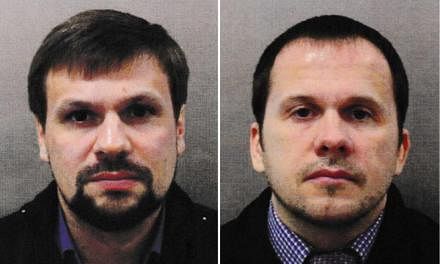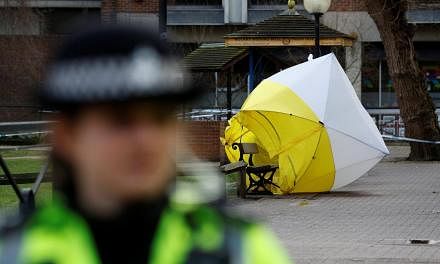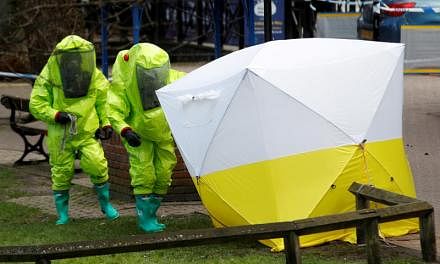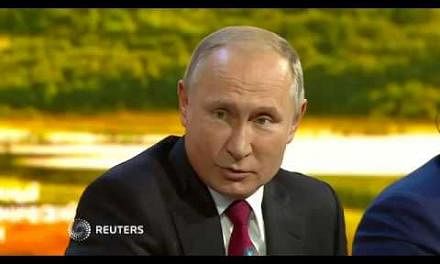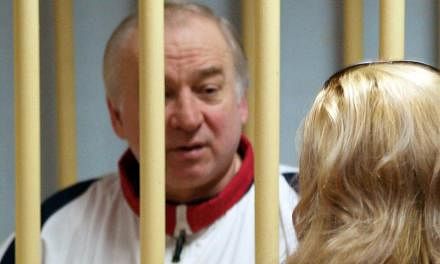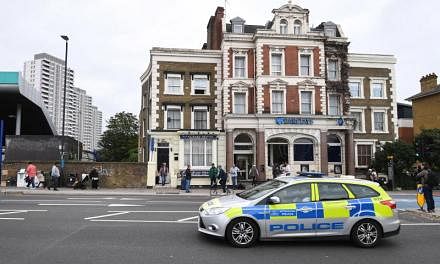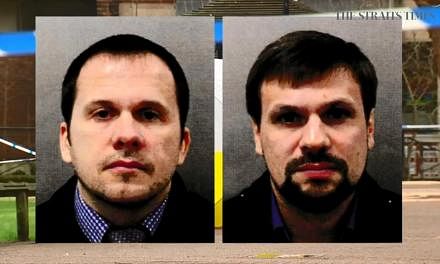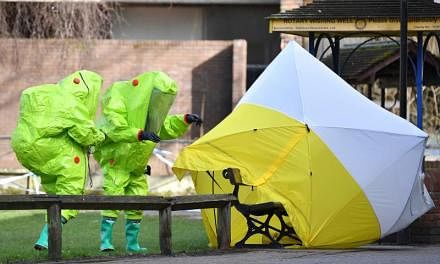MOSCOW (NYTIMES) - Cruising toward a certain victory in this Sunday's (March 18) presidential election, President Vladimir Putin briefly dropped his image as Russia's tough but merciful czar to make clear that he could forgive misdeeds by wayward subjects, but "not everything."
Asked what could not be forgiven, Putin said bluntly, "Betrayal." Putin's unforgiving contempt for treachery, displayed in a new hagiographic film released this week, provides the emotional and political backdrop to a pattern of Russian behaviour that, Prime Minister Theresa May of Britain announced Monday, made it "highly likely" that Moscow was responsible for a March 4 nerve-agent attack in Salisbury, England, on Sergei Skripal and his daughter, Yulia.
Viewed from London, the attack on Skripal, a former colonel in Russian military intelligence who was recruited as a spy by Britain, was in May's words, an "indiscriminate and reckless act" that "put the lives of innocent civilians at risk," while sending Russia's relations with the West into yet another downward spiral.
Britain followed through on those allegations Wednesday (March 14), expelling 23 Russian diplomats and outlining an array of other actions it would take.
But do not expect any apologies or even a serious discussion from Moscow. From the Kremlin's perspective, said Mark Galeotti, a Russia expert at the Institute of International Relations in Prague, it plays into "the central geopolitical narrative of the current incarnation of Putinism: Russia is just too formidable and fearsome to be ignored. This is all about demonstrating that Russia not only has capacity to act but the will to act, too."
Far from damaging Putin, with just days to go before Russia's presidential election, the accusations levelled at Moscow by Britain only reinforce Putin's position that Russia is a besieged fortress under constant threat from enemies within and outside its borders.
While steadfastly denying any involvement in the attack, the Kremlin has added the episode to a daily diet of news on state news media outlets that showcase what Putin, in a recent state of the nation address in Moscow, described as Russia's invincible might and its readiness to strike back at enemies wherever they are.
Like the new missile systems unveiled by Putin in that speech, the attack on Skripal has only added to the president's stature, at least among his base at home, as a fearless defender of the nation ready to do anything, no matter how risky, to assert Russia's status as a great power to be feared.
Rather than bow to British demands for an explanation of how a Russian-made military nerve agent ended up in Salisbury, Moscow went on the offensive. Foreign Minister Sergey Lavrov on Tuesday dismissed British accusations as "nonsense" and demanded that Britain hand over the nerve agent used against Skripal and his daughter. Russia, he added, had so far "received an incoherent response, which amounts to a rejection of our legitimate demands."
Just as Britain did earlier to Russia's ambassador in London, the Kremlin on Tuesday summoned the British ambassador to Moscow to demand an explanation.
Vladislav Inozemtsev, a Russia scholar currently at the Polish Institute of Advanced Studies in Warsaw, said the nerve-agent episode showed that "talking to Mr Putin has become senseless." The Russian president and his senior officials, he said, would "never assume responsibility," whatever the facts were, and would only gloat over the suffering of a traitorous former spy - still unconscious and in critical condition - while blaming Britain for it.
"They will stick to the thesis that Westerners kill agents they do not need anymore and then blame Russia," Inozemtsev said.
Russia under Putin, said Galeotti, an expert on Russia's security services, "has given up on winning respect through soft power and is pursuing what I call 'dark power.'" This approach, which involves Russia throwing its weight around and then revelling in the outrage this causes, Galeotti added in a telephone interview, "plays into Putin's own natural instincts that a great power is one that is feared. It is better and much easier to be feared than loved."
Of all the virtues in which Putin takes pride, none has more importance to the Russian leader - a veteran of a Soviet security apparatus built around a cult of loyalty to the state - than his commitment to the idea that nobody, especially not spies who defy their vows, can escape punishment for betrayal.
The Russian Embassy in London, in sneering statements on its website and Twitter feed, refers to the "Sergei Skripal Case," using quotation marks to suggest it does not believe there really is such a case.
Russia has yet to address in any detail the main piece of evidence pointing to a Russian hand - that Novichok agents have been produced only in Russia - and has instead developed conspiracy theories involving Ukraine, British revenge for past athletic defeats before this year's World Cup soccer tournament in Russia and other far-fetched explanations.
Moscow has been exasperated that its denials are not taken seriously and have been mocked relentlessly under a Twitter hashtag, #Russiadenies, even though officials have in the past acknowledged what they had earlier denied.
Maria V. Zakharova, the Russian Foreign Ministry's spokesman, mocked May's statement to Parliament in London as a "circus show," adopting a sneering and decidedly undiplomatic tone now in vogue among Russian diplomats and commentators.
But in an earlier comment, soon after news of the nerve gas attack in Salisbury broke, the evening news host on the state-controlled Channel One gave voice to what, under Putin, is the Russian state's view of traitors.
"I don't wish death on anyone, but for purely educational purposes, I have a warning for anyone who dreams of such a career," newscaster Kirill Kleimenov told viewers. "The profession of a traitor is one of the most dangerous in the world."

